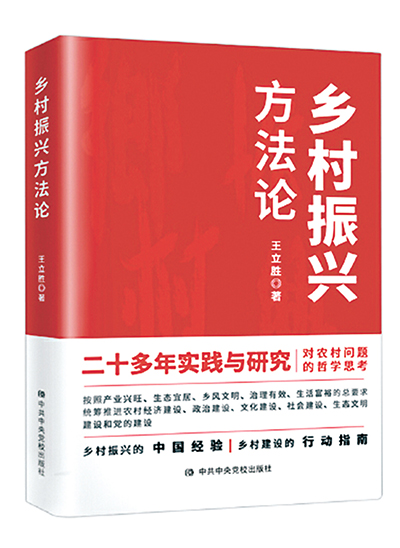Rural vitalization highlights county units

The Methodology of Rural Vitalization
The Methodology of Rural Vitalization, written by Wang Lisheng, a research fellow from the Institute of Philosophy at the Chinese Academy of Social Sciences, adheres to the overall grasp of the rural vitalization strategy. Especially, it emphasizes the overall promotion of rural vitalization by taking the county as the unit, and regards it as the best promotion unit, raising the county to the methodological height of implementing the rural vitalization strategy.
Wang has served as county mayor as well as Party secretary of a county-level city in Shandong Province, a major agricultural province. A county, as an administrative unit, is able to conduct top-level design and planning as a whole, and, meanwhile, carry out specific policies for different villages within the county area, so that the implementation of the rural vitalization strategy can not only meet the universal requirements of the central and provincial governments, but also closely combine with the specific conditions of villages. Taking counties as the basic implementation unit of the rural vitalization strategy is determined by the status and functions of county-level units in the intermediate link of the national administrative system.
Rural vitalization not only focuses on rural areas, but essentially reshapes urban-rural relations in the new era, namely, the integrated development of urban and rural areas. The county as an administrative unit is exactly the transition area between cities and rural areas, which is the spatial representation of urban-rural integration.
The book systematically elaborates upon counties’ administrative function, political system function, function of geographical and cultural units, economy and market function, and function of political subjects, to support the proposition of “taking the county as the method.”
The No. 1 Central Document for 2021 clearly proposed taking the county territory as an important entry point of integrated urban-rural development, coordinating spatial layout including county-level industries, infrastructure, public services, basic farmland, ecological protection, town development, and village distribution, and achieving functional connection and complementation of counties and villages. It proposed strengthening county economies, advancing urbanization with the county as a carrier, and promoting the household registration of migrant workers in local counties.
China started from a great ancient agricultural country on the way to modernization. A large country with small farmers is China’s basic national condition, and its urbanization and modernization is a long process that can’t be hasteful. In addition to a few “outshining” first-tier cities, there should be county territories and towns blooming together, which is exactly what we need to work on in the long run.
Wu Chongqing is a professor from the Department of Philosophy at Sun Yat-sen University.
Edited by YANG LANLAN

 PRINT
PRINT CLOSE
CLOSE